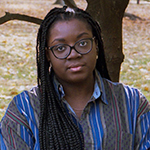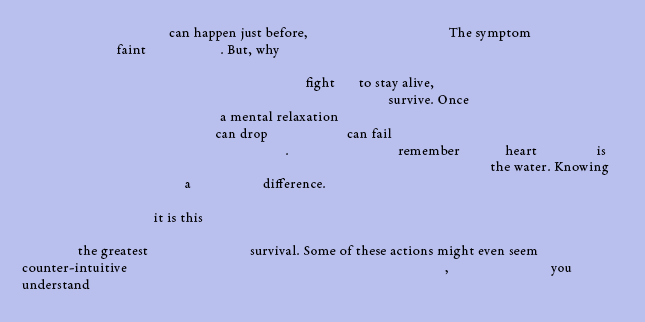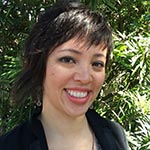Hell is for children
my mother told me she was afraid my miscarried child was in hell / because i probably didn’t bless the right thing / it had crossed my mind before / i keep telling myself i’m a masochist
/ logic tells me she’s the one in hell and she’s not my responsibility / the glass glaze of her eyes / ice addict / bird screech / makes the sound of twisted wire / razor edges of her eyes / port and starboard / bow and stern / blinks of a swallow / concrete of headsmen
driving my children home from the shops / dead body / in a white bag / small / balance of my skull / i should have waited until it was placed in the ambulance / for their sake / i didn’t / they just said / because they couldn’t see a face / lucky / there is no body there
i still think of her voice / bird of wire / my body / jesus’ edged arms / crust of bread /
i am here / typing on a chair during the day / the moon is just a stamp / white ink like bleach stains on my pants / she told me my father locked her out of the house because / he saw her dance / in church / do you remember the times you locked me out of your house / her face / scrunched flowers / fire and petals / eyes full of hot water / fish bowls / pupils like fish / bumping into the glass / ever since i disowned my parents i have stopped pointing the gun / unloosening the crust is an art / the unspilling of the core of the bread like warm butter
i am a woman / i only open when i am beautiful and full of wine in their proper glasses because /
i am afraid of all men
and especially god / seduced by his misery
if i lose this marriage / i will have to go to war
the outside will never become the inside because / i don’t understand how the doorbell sound climbs through the wires without losing its breath / it rings high on the wall where i can’t reach / i am photo-framed / a vignette / ovalled / with dried flowers / bouquet of my wedding day
the moneyed clothes of children / unworn skin / jesus was a child before he broke on the cross /
god is a child still / he hasn’t learnt that floods drown more than clothes / i let his body melt in my mouth / i taught him to paint a mask in art class / all the children used the same template / he used to hide under tables because he was so afraid to speak / i found a gun in his own handwriting / between the pages of his homework book / i reported it / they told me i / think too much
the world is a cup we keep breaking / hands of wire and rockets to mars / the reenactment of traumata and the drama of war / eyes and mouths of fish rise out of their tank to gasp for air / of children and their dead wheel of recrimination
the awakening of shields instead of swords / swallows that fly / the rise of air grained with soil / feather roofs / mixture of diamond jewelry and my children’s teeth in my antique vase / feather tail of a tower in the clouds of a church / choices of cheeses / i curl sticks into hooks / cervix / spout of a watering can / erectile function / god’s staff looking / for food for snakes / swan necks / upended in lakes / fish in their baskets / coins in caps / hands covering my laugh / he yells because she hides under me / his hand is stuck in my body like an axe in a table / i continue polishing trays / set them in the middle / i am the moonrise / pegasus / white horse / the hippocampus is responsible for memory and emotion / it looks like a sea horse
box of rooms / scum of unwiped showers / i wanted to save it in a jar just to make sure / my husband unclasped my fist to let it flow / the tap water is still running / clean / the windows in my room are corniced / webbed and spidered / and shuttered
my father never sat me down and told me it was wrong / i heard him say in the kitchen that he didn’t know what the circumstances were / and it was none of his business / i learnt from psychology books that children can never be blamed / even if they get caught masturbating / my father never hit my mother / but i saw him wield a chair / i was in a rocking chair in the air / my husband never hit me / with a chair / my mother didn’t call me by name / i was known as slut / but in a different language
our conversations / the embedment of dormant sticks in bushes
one day i felt the fully gathered frill / the tight knits of ribs in feet / i taught my daughter how to pull cotton through fabric before / she entered school / you teach children how to read by waiting for them to swim the syllables of words and / then / encouraging them to re-read the sentence to let that obstacle word float in
i told my son it was okay to be angry and write / fuck / in his journal
self-correction of human hands / not the way i hold hands with street wires / even / fingertips will do
i took out a pen from my bag and / lent it to my mother / she said she gave it to me for my birthday
there is a box of pens near the bank teller / most people don’t take any because / it is embarrassing / to take things for free / a couple take one / i swipe the whole box
writing is the thick sick in your stomach / intestines snaking in hulls / expunges of hells /
i’m afraid that cleaning up the undigested from stomachs will lead to the whole family catching gastroenteritis / feeling sick and caring for others makes me feel like i’m dying
i’m not a narcissist / i do not sit at a certain time / i don’t stop when you tell me to red the light or /green it / this narrative is not a performance / i’m not on a stage / i’m in a temple / the sick crow eats from my hand / the remarkable result of the medical report with / the intention to infect
all letters are in lowercase for /the hubris in some words contain the salience / of / conjunctions and determiners / the droughting of passed waters / the surety of the present and the future that never rolls far enough down my tongue to break through my teeth
flamed firewood and cooking smoke / air as shaved as water
i have naturally strong thighs / my physiologist asked me if i was a dancer / feet tapping on coffins / hardwood / the springs in my back
unhooking my origin is the skinning of my culture for it is a palm that does not maintain its curve / the flaccidity of fingers / non-cradle / there are simply no peels to pick up
suicide bombers become terrorists because / that is their only culturally acceptable way to escape
i have a propensity to stare at my kids when their eyes are closed / i am afraid of what i am able to create because / of what i able to take away / i want to feel love between us but / i have never felt it myself
o death, where is your sting / i keep chewing on this soft wedge of death / if i have never loved then / i don’t ever to pay
i still find it difficult to spear the fish / hoist them into their innocent yawns / heavy necklace / sun rays around my neck / anger / in my mouth curdled / between my legs / the violation of a hard tail / high heels like phallus sticks / ankles of our infant stems
i wake from her bed of bone
she sails into the eastern sun / leaves / swords that have been swallowed /scarves tamped in gaps in stone barns / like rapunzel’s hair / fibers of thighs unfolding / undoing the stone of his tower / vines / veins of worms sliding in the middle of his body / the billowing of his gowns
THE END

Annie Blake is an Australian writer and divergent thinker. She is a wife and mother of five children. She started school as an EAL student and was raised and, continues to live in a multicultural and industrial location in the West of Melbourne. Her research aims to exfoliate branches of psychoanalysis and metaphysics. She is currently focusing on in medias res and art house writing. She enjoys semiotics and exploring the surreal and phantasmagorical nature of unconscious material. Her work is best understood when interpreting them like dreams. She is a member of the C G Jung Society of Melbourne. You can visit her on annieblakethegatherer.blogspot.com.au and on Facebook.

 BACK TO ISSUE
BACK TO ISSUE










